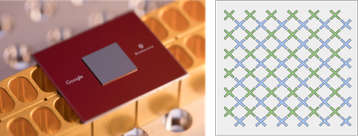Google has presented a 72-qubit quantum processor at the American Physical Society’s annual meeting in Los Angeles.
The company hopes that ‘Bristlecone’ could be used to achieve quantum supremacy - that is, being able to outperform a classical supercomputer on a well-defined computer science problem - but admits that much work still remains.
The race to be supreme
“Although no one has achieved this goal yet, we calculate quantum supremacy can be comfortably demonstrated with 49 qubits, a circuit depth exceeding 40, and a two-qubit error below 0.5 percent,” Julian Kelly, research scientist at Google’s Quantum AI Lab, said in a blog post.
“We believe the experimental demonstration of a quantum processor outperforming a supercomputer would be a watershed moment for our field, and remains one of our key objectives.”
Google has a working processor with more than 49 qubits, but the company has yet to achieve such low error rates at scale. Previously, it was able to demonstrate “low error rates for readout (1 percent), single-qubit gates (0.1 percent) and most importantly two-qubit gates (0.6 percent)” on its 9-qubit processor.
“We are looking to achieve similar performance to the best error rates of the 9-qubit device, but now across all 72-qubits of Bristlecone,” Kelly said.
“We believe Bristlecone would then be a compelling proof-of-principle for building larger scale quantum computers. Operating a device such as Bristlecone at low system error requires harmony between a full stack of technology ranging from software and control electronics to the processor itself. Getting this right requires careful systems engineering over several iterations.”
Kelly added: “We are cautiously optimistic that quantum supremacy can be achieved with Bristlecone, and feel that learning to build and operate devices at this level of performance is an exciting challenge! We look forward to sharing the results and allowing collaborators to run experiments in the future.”
Google’s closest competitor in this space is IBM, which offers access to a 20-qubit system through a cloud service and is testing a 50-qubit machine. Earlier this month, Alibaba began offering access to an 11-qubit system.
Microsoft, meanwhile, has taken a different approach, and is researching topological quantum computers.

